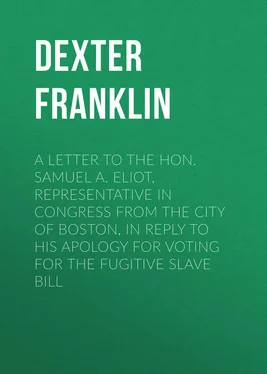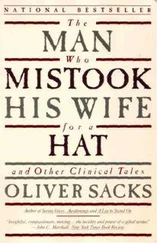Franklin Dexter - A Letter to the Hon. Samuel A. Eliot, Representative in Congress From the City of Boston, In Reply to His Apology For Voting For the Fugitive Slave Bill
Здесь есть возможность читать онлайн «Franklin Dexter - A Letter to the Hon. Samuel A. Eliot, Representative in Congress From the City of Boston, In Reply to His Apology For Voting For the Fugitive Slave Bill» — ознакомительный отрывок электронной книги совершенно бесплатно, а после прочтения отрывка купить полную версию. В некоторых случаях можно слушать аудио, скачать через торрент в формате fb2 и присутствует краткое содержание. Жанр: foreign_antique, foreign_prose, на английском языке. Описание произведения, (предисловие) а так же отзывы посетителей доступны на портале библиотеки ЛибКат.
- Название:A Letter to the Hon. Samuel A. Eliot, Representative in Congress From the City of Boston, In Reply to His Apology For Voting For the Fugitive Slave Bill
- Автор:
- Жанр:
- Год:неизвестен
- ISBN:нет данных
- Рейтинг книги:5 / 5. Голосов: 1
-
Избранное:Добавить в избранное
- Отзывы:
-
Ваша оценка:
- 100
- 1
- 2
- 3
- 4
- 5
A Letter to the Hon. Samuel A. Eliot, Representative in Congress From the City of Boston, In Reply to His Apology For Voting For the Fugitive Slave Bill: краткое содержание, описание и аннотация
Предлагаем к чтению аннотацию, описание, краткое содержание или предисловие (зависит от того, что написал сам автор книги «A Letter to the Hon. Samuel A. Eliot, Representative in Congress From the City of Boston, In Reply to His Apology For Voting For the Fugitive Slave Bill»). Если вы не нашли необходимую информацию о книге — напишите в комментариях, мы постараемся отыскать её.
A Letter to the Hon. Samuel A. Eliot, Representative in Congress From the City of Boston, In Reply to His Apology For Voting For the Fugitive Slave Bill — читать онлайн ознакомительный отрывок
Ниже представлен текст книги, разбитый по страницам. Система сохранения места последней прочитанной страницы, позволяет с удобством читать онлайн бесплатно книгу «A Letter to the Hon. Samuel A. Eliot, Representative in Congress From the City of Boston, In Reply to His Apology For Voting For the Fugitive Slave Bill», без необходимости каждый раз заново искать на чём Вы остановились. Поставьте закладку, и сможете в любой момент перейти на страницу, на которой закончили чтение.
Интервал:
Закладка:
In the debates which ensued on this clause, Mr. Ellsworth, one of the committee who reported it, "was for leaving the clause as it now stands. Let every State import what it pleases. The morality or wisdom of slavery are considerations belonging to the States themselves. What enriches a part enriches the whole , and the States are the best judges of their particular interests. The old Confederation had not meddled with this point, and he did not see any greater necessity for bringing it within the policy of the new one." "As slaves multiply so fast in Virginia and Maryland that it is cheaper to raise than to import them, whilst in the sickly rice-swamps foreign supplies are necessary , if we go no farther than is urged [a proposal to permit the trade for a limited time], we shall be unjust towards South Carolina and Georgia. Let us not intermeddle." ( Madison Papers , pp. 1389, 1391.) This gentleman was one of your "very wise men"; and his mantle has recently fallen upon other wise men from the East. Mr. Wilson, another member of the committee, objected. "All articles imported," said he, "are to be taxed; slaves alone are exempt. This is, in fact, a bounty on that article." The clause was referred to another committee, who modified it, by limiting the restriction to 1800. It was moved to guarantee the slave-trade for twenty years, by postponing the restriction to 1808. This motion was seconded by Mr. Gorham, another member of the committee. Mr. Randolph, also of the committee, was against the slave-trade, and opposed to any restriction on the power of Congress to suppress it. Two of the committee, then, we find, were against the trade, and three, Messrs. Rutledge, Ellsworth, and Gorham, for perpetuating it. And now, Sir, what were the inducements which prevailed on the two wise men from the East to yield their consent to a proposition so wicked and abominable? We are, of course, not informed what passed in the committee, but we can well imagine, from the language used by the chairman and others in the Convention. Said Mr. Rutledge, "If the Convention thinks North Carolina, South Carolina, and Georgia will ever agree to this plan [the Federal Constitution] unless their right to import slaves be untouched, the expectation is VAIN. The people of those States will never be such fools as to give up so important an interest." In other words, "Gentlemen of the North, no Union without the African slave-trade." Said Mr. Charles Pinckney, "South Carolina can never receive the plan [of the Constitution] if it prohibits the slave-trade. In every proposed extension of the powers of Congress, that State has expressly and watchfully excepted that of meddling with the importation of negroes." ( Madison Papers , p. 1389.) Mr. Charles C. Pinckney "thought himself bound to declare candidly, that he did not think South Carolina would stop her importations of slaves in any short time." Thus you see, Sir, that the "deliberate declarations" to which you allude were made in reference to the continuance of the African slave-trade, and not, as you suppose, to the catching of fugitive slaves. Two New England gentlemen of the committee yielded to these declarations, and sacrificed conscience and humanity for the sake of the Union, and the consideration that what enriched a part enriched the whole. Happily, in this case, Southern bluster was met by Southern bluster, and it is owing to Virginia, and not to the virtue and independence of New England, that the Constitution was rescued from the infamy of granting a solemn and perpetual guarantee to an accursed commerce.
In Virginia, the slaves, as Mr. Ellsworth remarked, multiplied so fast, that it was cheaper to raise than import them. She was then, as now, a breeding State for the Southern markets. Hence, her delegates were as ready to bluster for protection, as the South Carolina delegates were for a free trade in men and women. Of course, the motives assigned were patriotic, not selfish. Mr. Randolph "could never agree to the clause as it stands. He would sooner risk the Constitution." ( Madison Papers , p. 1396.) Mr. Madison would not consent to the continuance of the traffic till 1808. "Twenty years will produce all the mischief that can be apprehended from the liberty to import slaves. So long a term will be more dishonorable to the American character, than to say nothing about it in the Constitution." ( Madison Papers , p. 1427.) Mr. Mason from Virginia denounced the traffic as "infernal." ( Madison Papers , p. 1390.) The result of all these threats on each side was, as usual, a compromise, by which Congress was prohibited from suppressing the foreign and internal commerce in slaves for twenty years, and was left at liberty to do as it might see fit, after that period. After twenty years the foreign trade was suppressed, and North and South Carolina and Georgia remained in the Union! Virginia, as well as the other Slave States, is greatly interested in the home slave-trade, and that has not been suppressed, although Congress has full power over it.
It does not appear from Mr. Madison's report what reply was made in the Convention to the Virginia objections, but in his speech in the Convention of his own State, he tells us, – "The gentlemen from South Carolina and Georgia argued in this manner: We have now liberty to import this species of property, and much of the property now possessed had been purchased or otherwise acquired in contemplation of improving it by the assistance of imported slaves. What would be the consequence of hindering us in this point? The slaves of Virginia would rise in value, and we should be obliged to go to your markets." ( Elliott's Debates , III. 454.) Certainly, Sir, these South Carolina and Georgia delegates were "very wise men," and their predictions are now history, and the planters of Georgia, South Carolina, Mississippi, and Louisiana buy slaves of the Virginia breeders. But what shall I say of the wise men from the East? This horrible compromise, this guarantee of the African slave-trade for twenty years, was carried by the votes of the Massachusetts and Connecticut delegates, and would have been defeated, had they had the courage and virtue to have voted against it.
I have indulged in this long digression, to show that the clause in the Constitution respecting fugitive slaves was not, as you represent it, the great compromise of the Constitution, the key-stone of the Union, and that our slaveholding fathers were not, as you suppose, greatly perplexed, nor their consciences deeply wounded, by the existence of slavery in all the States of the confederacy with one exception. Having disposed of your history, I return to your logic.
Whether the constitutional injunction to surrender fugitive slaves was a compromise or not, is of no practical importance. The clause speaks for itself, and prescribes no mode by which the title of the claimant shall be ascertained, while it expressly implies that the title shall be established before the surrender is made. Hence, the fair presumption is, that the title to a MAN shall be proved, with at least as much certainty and formality as the title to a horse. Had you, Sir, in your law, provided that a Virginian shall not come to Boston, and there seize and carry off a husband, wife, or child but by the same process, and on as strong evidence, as he may now seize and carry off a horse which you claim as your own, instead of finding your name a byword and a reproach, you would have been honored and applauded by your fellow-citizens, and returned to Congress by a triumphant vote; nor is there a syllable in the Constitution which prohibits or discountenances such a mode of deciding the title to a human being. It is in vain, then, Sir, that you plead your "constitutional obligation" in justification of your most detestable law. But, as if one wrong could justify another, you plead in your excuse the law of 1793, and you ask in your simplicity of those who condemn your law if they do not perceive that they are "denouncing their fathers." Well, Sir, were our fathers infallible? Pity it is, Sir, that you were not on the floor of Congress when that body declared the African slave-trade to be PIRACY. You might then, Sir, have risen in your place, and inquired, "Do you not perceive that you are denouncing your fathers, who were very wise men, and who guaranteed for twenty years the very traffic which you now proclaim to be piracy?" Pity it is, Sir, that you did not stand by the side of your patron on Plymouth Rock, and whisper in his ear, "Do you not perceive that you are denouncing our fathers?" when he declared, "In the sight of our law the African slave-trader is a PIRATE and a FELON, and in the sight of Heaven an offender beyond the ordinary depth of human guilt." Mr. Webster is better versed in constitutional history than you are, and he well knew that some of our fathers "deliberately declared they would not enter a Union" in which they were to be debarred from pursuing this piratical, felonious, guilty traffic. Our fathers were mostly slaveholders, and yet you, Sir, unconsciously denounce both their morality and intelligence, when you affirm the institution of slavery to be "wrong and unwise." And yet all who presume to find fault with your cruel, unjust, wicked law are guilty forsooth of denouncing their fathers!
Читать дальшеИнтервал:
Закладка:
Похожие книги на «A Letter to the Hon. Samuel A. Eliot, Representative in Congress From the City of Boston, In Reply to His Apology For Voting For the Fugitive Slave Bill»
Представляем Вашему вниманию похожие книги на «A Letter to the Hon. Samuel A. Eliot, Representative in Congress From the City of Boston, In Reply to His Apology For Voting For the Fugitive Slave Bill» списком для выбора. Мы отобрали схожую по названию и смыслу литературу в надежде предоставить читателям больше вариантов отыскать новые, интересные, ещё непрочитанные произведения.
Обсуждение, отзывы о книге «A Letter to the Hon. Samuel A. Eliot, Representative in Congress From the City of Boston, In Reply to His Apology For Voting For the Fugitive Slave Bill» и просто собственные мнения читателей. Оставьте ваши комментарии, напишите, что Вы думаете о произведении, его смысле или главных героях. Укажите что конкретно понравилось, а что нет, и почему Вы так считаете.











